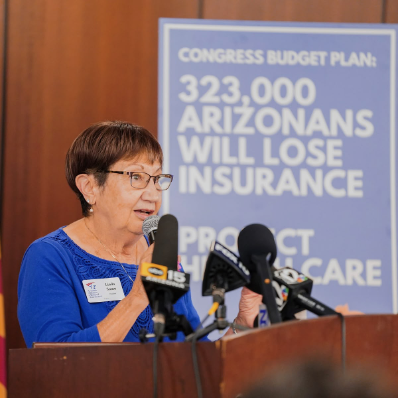|
|
President Trump Signs Budget and Tax Bill That Guts Health Care Millions of Older Americans Rely On to Pad Pockets of the Ultra-Wealthy |
|
The Republican Budget Reconciliation bill was signed into law on Friday morning. The law includes the largest cuts to health care and taxes in United States history, trillions in tax cuts for the wealthiest Americans and corporations, and adds at least $3.3 trillion to the nation’s deficit. Alliance Executive Director Richard Fiesta released a press statement detailing some of the ways the legislation will harm older Americans, including:
“Congressional Republicans and the President have turned their backs on the very people they were elected to serve,” said Fiesta. “This bill isn’t about lowering prices or helping everyday Americans — it’s about lining the pockets of billionaires and big corporations while ripping away essential health care and support from seniors, people with disabilities, and working families. We will not forget how our representatives voted. We will make sure every older American knows what is in this legislation — and who to hold accountable for this debacle.” |
|
|
|
Left: Arizona Alliance President Linda Somo speaks during a joint press conference with Arizona Food Bank Network, Ability360, Children's Action Alliance and the Arizona Center for Economic Progress on Wednesday. Right: California Alliance members rally against the Republican Budget bill in Bakersfield. |
|
Social Security Administration Updates Website to Include New Office Closures |
|
The Social Security Administration has updated its “Office Closings and Emergencies” page to list several field offices as “only able to provide assistance by telephone until further notice.” These include the Hoboken and Toms River offices in New Jersey; the Canarsie, Corning and West Nyack offices in New York; the Lewistown and Bloomsburg offices in Pennsylvania; and offices in Logan, West Virginia and Cody, Wyoming.
The changes disrupt service for beneficiaries in those areas and will likely mean longer waits on the phone and travel for those who need to visit a Social Security office in person. Wyoming seniors already have to drive more than four hours, on average, in order to visit a field office. Those who live in the western part of Wyoming will now be forced to travel to the eastern side for in person service. Older West Virginians in the first congressional district – where the Logan field office is located – currently have to travel more than one hour to get help at a Social Security office.
Earlier this year, Social Security beneficiaries in the Hudson Valley region of New York were left in the lurch when officials closed an SSA field office in White Plains. They will have even fewer options now that Canarsie and West Nyack are no longer providing in-person service.
These disruptions will upend SSA Commissioner Frank Bisignano’s efforts to provide “an omnichannel approach” to customer service and “meet people where they are,” which he stated is his ultimate goal for the agency during a hearing last week.
“We will continue to monitor updates from the Social Security Administration regarding field office closures and phone service and urge the SSA to re-open the doors,” said Robert Roach, Jr., President of the Alliance. “The SSA Commissioner promised that seniors will be able to access SSA’s customer service in the manner that works best for them, however these ‘temporary’ closures are raising questions about his commitment to serving beneficiaries.” |
|
New U.S. Census Data Shows High Immigration and an Aging Population |
|
In a new report by the U.S. Census Bureau, researchers found that immigration is a major driver of the country’s population growth and that while children outnumber seniors, seniors’ share of the population is rising.
The percentage of the population over the age of 65 increased by 3.1 percent from 2023 to 2024, largely due to declining birth rates. In 2024, eleven states — compared to three in 2020 — had more seniors than people under 18. Those states are: Delaware, Florida, Hawaii, Maine, Montana, New Hampshire, Oregon, Pennsylvania, Rhode Island, Vermont, and West Virginia. In addition, the number of metro areas with a larger share of older Americans nearly doubled, from 58 in 2020 to 112 last year. “If these trends continue, it will have a profound impact on all parts of our society,” said Joseph Peters, Jr., Secretary-Treasurer of the Alliance. “As our country continues to age, we must support seniors and protect the earned benefits and healthcare they rely on.” |
|
KFF Health News: Republican Megabill Will Mean Higher Health Costs for Many Americans By Phil Galewitz and Julie Appleby and Renuka Rayasam and Bernard J. Wolfson |
|
President Donald Trump’s “One Big Beautiful Bill” cuts federal spending on Medicaid and Affordable Care Act marketplaces by about $1 trillion over a decade, according to the nonpartisan Congressional Budget Office, threatening the physical and financial health of tens of millions of Americans.
The bill, which the Senate passed Tuesday, would reverse many of the health coverage gains of the Biden and Obama administrations, whose policies made it easier for millions of people to access health care and reduced the U.S. uninsured rate to record lows.
The Senate plan to slash Medicaid and ACA marketplace funding could lead to nearly 12 million more people without insurance by 2034, the CBO estimates. That in turn would harm the finances of hospitals, nursing homes, and community health centers — which would have to absorb more of the cost of treating uninsured people — and may force them to reduce services and employees, as well as close facilities.
|
|
Thanks for reading. Every day, we're fighting to lower prescription drug prices and protect retirees' earned benefits and health care. But we can't do it without your help. Please support our work by donating below. |
|
|
|
|
Alliance for Retired Americans | 815 16th Street, NW | Washington, DC 20006 | www.retiredamericans.org



